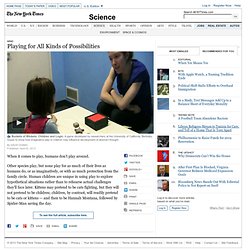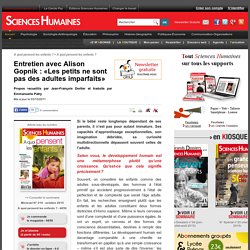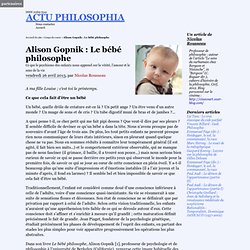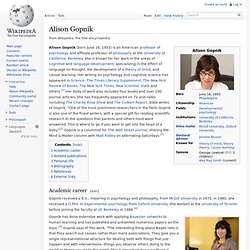

Alison Gopnik Homepage. Zeal for Play May Have Propelled Human Evolution. By Jeff DelViscio, Pedro Rafael Rosado, Abe Sater, Robin Lindsay and Kriston Lewis Buckets of Blickets: Children and Logic: A game developed by researchers at the University of California, Berkeley, hopes to show how imaginative play in children may influence development of abstract thought.

Podcast: Science Times Abby Ellin on the increasing numbers of older people turning up in therapy, Carl Zimmer on an effort to see why Spot runs or fetches or ignores you, and David Dobbs on how play contributes to human success. Therapy for the Golden Years, Crowdsourced Canines, Mind Games Update Required To play the media you will need to either update your browser to a recent version or update your Flash plugin. Alison Gopnik and the Gopnik Lab/University of California, Berkeley Esther and Benny, both 5, played Blickets with Sophie Bridgers in a lab at the University of California, Berkeley. And in doing so, they develop some of humanity’s most consequential faculties. Dr. Dr. Alison Gopnik : Que pensent les bébés? Professor of Psychology, UC Berkeley. Alison Gopnik is a professor of psychology and affiliate professor of philosophy at the University of California at Berkeley.

She received her BA from McGill University and her PhD. from Oxford University. Her honors include a Natural Sciences and Engineering Research Council of Canada University Research Fellowship, an Osher Visiting Scientist Fellowship at the Exploratorium, a Center for the Advanced …Studies in the Behavioral Sciences Fellowship, and a Moore Fellowship at the California Institute of Technology. She is an internationally recognized leader in the study of children’s learning and development and was the first to argue that children’s minds could help us understand deep philosophical questions.
She was one of the founders of the study of "theory of mind", illuminating how children come to understand the minds of others, and she formulated the "theory theory", the idea that children’s learn in the same way that scientists do. Alison Gopnik : le scientifique dans le berceau. Entretien avec Alison Gopnik : «Les petits ne sont pas des adultes imparfaits» Si le bébé reste longtemps dépendant de ses parents, il n’est pas pour autant immature.

Ses capacités d’apprentissage exceptionnelles, son imagination débridée, sa curiosité multidirectionnelle dépassent souvent celles de l’adulte. Selon vous, le développement humain est une métamorphose plutôt qu’une croissance. Qu’est-ce que cela signifie précisément ? Souvent, on considère les enfants comme des adultes sous-développés, des hommes à l’état primitif qui accèdent progressivement à l’état de perfection et de complexité que serait l’âge adulte. En fait, les recherches enseignent plutôt que les enfants et les adultes constituent deux formes distinctes d’Homo sapiens. Alison Gopnik : Le bébé philosophe. A ma fille Louise ; c’est toi le printemps.

Ce que cela fait d’être un bébé Un bébé, quelle drôle de créature est-ce là ? Un petit ange ? Un être venu d’un autre monde ? Un nuage de sons et de cris ? A quoi pense t-il, ce cher petit qui me fait pipi dessus ? Traditionnellement, l’enfant est considéré comme doué d’une conscience inférieure à celle de l’adulte, voire d’une conscience quasi-inexistante. Dans son livre Le bébé philosophe, Alison Gopnik [1], professeur de psychologie et de philosophie à l’université de Berkeley (Californie), renverse cette image habituelle des bébés. « A une époque pas si reculée mais pas très reluisante, les psychologues pensaient que les bébés ne pouvaient être attentifs que d’une manière automatique, de l’ordre du réflexe, sans utiliser du tout leurs centres cérébraux supérieurs. Alison Gopnik. Academic career[edit] Gopnik received a B.A., majoring in psychology and philosophy, from McGill University in 1975.

In 1980, she received a D.Phil. in experimental psychology from Oxford University. She worked at the University of Toronto before joining the faculty at UC Berkeley in 1988.[4] Lecturing at SkeptiCal - Berkeley, CA - April 21, 2012 - "The Philosophical Baby: What Children's Minds Tell us about Truth, Love and the Meaning of Life" Gopnik has done extensive work with applying Bayesian networks to human learning and has published and presented numerous papers on the topic.[4] Gopnik says of this work, "The interesting thing about Bayes nets is that they search out causes rather than mere associations.
Judea Pearl, developer of Bayesian networks, says Gopnik was one of the first psychologists to note that the mathematical models also resemble how children learn. In April, 2013, Gopnik was inducted into The American Academy of Arts and Sciences.[7] Notable publications[edit]